In the retail industry, smart stores that use digital technology to improve customer experience are garnering attention. AEON RETAIL Co., Ltd. (hereinafter "AEON RETAIL") is currently promoting a national initiative to transform their stores into smart stores, starting with AEON STYLE Kawaguchi in Kawaguchi City, Saitama Prefecture. In this article, we interviewed Minoru Yamamoto, the executive officer and general manager of the System Planning Division at AEON RETAIL, and Tomomi Suzuki, the manager of Fujitsu's Digital Solution Service Business Division, who uses technology to support AEON RETAIL's business activities. We discussed what they hope to achieve by transforming AEON RETAIL's stores into smart stores.
- Table of Contents
AEON RETAIL Leads Smart Store Transformation for Customers and Communities
AEON RETAIL's corporate mission is "Pursuing peace, respecting humanity, and contributing to communities, always with the customer's point view as its core."
As part of realizing their mission, AEON RETAIL is promoting an initiative to transform their stores into smart stores.
Leading this new initiative is Minoru Yamamoto, the executive officer and general manager of the System Planning Division at AEON RETAIL. We asked him about his thoughts on this smart store transformation.
 Minoru Yamamoto, Executive Officer and General Manager of the System Planning Division, AEON RETAIL Co.,Ltd.
Minoru Yamamoto, Executive Officer and General Manager of the System Planning Division, AEON RETAIL Co.,Ltd.
――Could you please tell me why your company was the first in the industry to implement smart stores?
Yamamoto: Japan is lagging far behind other countries in terms of investing in digital transformation (DX). In the retail industry, while other countries are successively offering novel buying experiences that utilize digital technology, in Japan, it still remains that customers tolerate purchasing styles longtime unchanged. As a national retail chain, we must move on undelayed with the industry and drive DX in the Japanese retail industry by proactively investing in smart stores, as well as advance reforms to provide customers with better buying experiences.
――What thoughts do you have while working on transforming stores into smart stores?
Yamamoto: We have two main perspectives. First, by improving customer experience (CX), we would like our customers to perceive value in our stores beyond mere product sales. Using digital technology, we want to develop new touchpoints with customers while also providing convenient and friendly buying experiences, like a timely assist of what customers want to purchase or get information. The second perspective is employee experience (EX). By extending the impact of our use of digital technology to our employees' working practices and work environment, we hope to increase operational productivity and ultimately improve job satisfaction.
A Retail Revolution Brought About by Technology and Data-Driven Store Operations
Retailers are being encouraged to shift away from traditional merchandising and store design, such as by implementing safe and secure operations that help both customers and employees avoid the 3C's. To address these needs, AEON RETAIL has adopted Fujitsu's AI video analysis solution, GREENAGES Citywide Surveillance (hereinafter "CWS") as part of its smart store transformation initiative. Operation began in May 2021 at AEON STYLE Kawaguchi (Kawaguchi City, Saitama Prefecture)
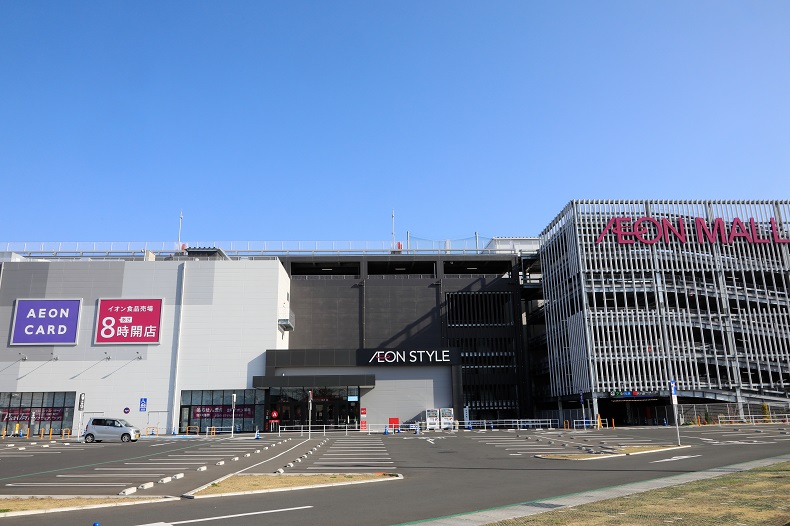 AEON STYLE Kawaguchi, currently being transformed into a smart store.
AEON STYLE Kawaguchi, currently being transformed into a smart store.
Yamamoto: One of the reasons we chose to adopt CWS was because we could use the cameras that we had already installed. The system is also very accurate at detecting humans and can identify the gender and age of shoppers based on features such as their physique and clothing, even if they are wearing masks. That was the decisive factor. We felt that if we were able to acquire and analyze real data from stores more accurately, it would drastically change customer flow analysis and marketing in general.
Tomomi Suzuki, the manager of Fujitsu's Digital Solution Service Business Division, is in charge of the overall planning for CWS implementation—including investigating the issues on the retail floor, carrying out real-world testing, and developing KPIs. We interviewed her about her thoughts on this collaboration with AEON RETAIL.
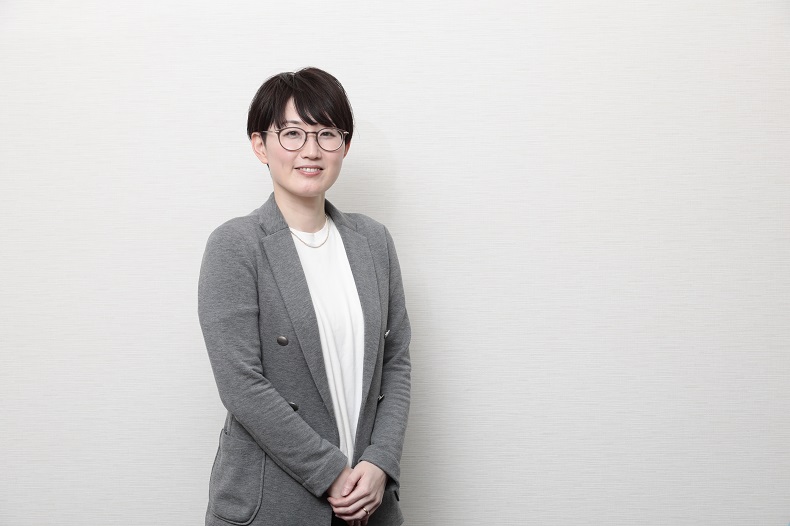 Tomomi Suzuki, Manager, Digital Solution Service Business Division, Fujitsu
Tomomi Suzuki, Manager, Digital Solution Service Business Division, Fujitsu
――What thoughts did you have about smart store transformation as you worked on this collaborative project?
Suzuki: First, amid the risk of COVID-19 infection, I wanted to improve the working conditions of the frontline workers who maintain society's essential infrastructure, such as supermarket operators and store staff. Second, I believe the buying experiences in brick-and-mortar stores in Japan have much room for improvement. We would like to use Fujitsu's technology and service to improve the management of brick-and-mortar stores.
――Please tell me about Fujitsu's GREENAGES Citywide Surveillance system.
Suzuki: This system uses AI to analyze video data acquired through network cameras, which are common security tools installed on store ceilings.
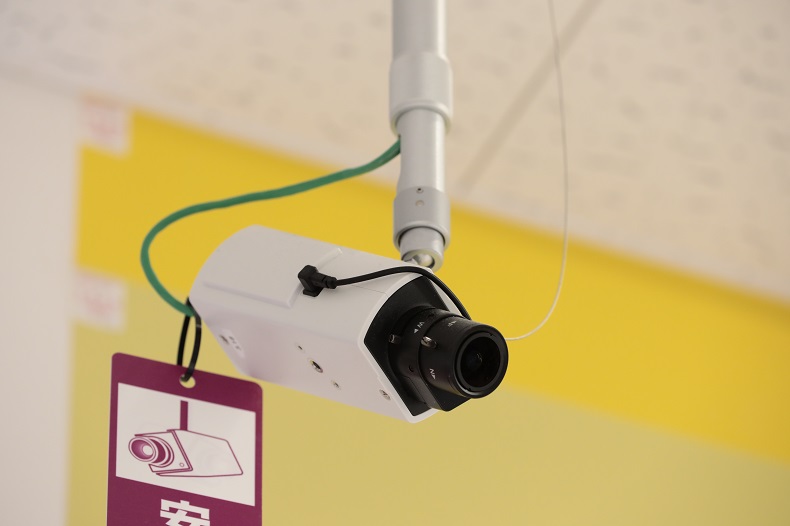 AEON STYLE Kawaguchi is equipped with 150 AI cameras.
AEON STYLE Kawaguchi is equipped with 150 AI cameras.
There are two major uses for this system. The first is "event detection." AI can automatically detect certain events so that store staff don't have to visually identify each event. One example is “customers considering to buy” detection. AI can now detect when customers need assistance and give notice staff on their devices, leading to prompt and optimally-timed customer service without staff had to stay on the floor and mind customers' shopping.
 When a customer is on the sales floor for a certain period of time, the AI determines that customer service is needed and sends a notification to employee's device.
When a customer is on the sales floor for a certain period of time, the AI determines that customer service is needed and sends a notification to employee's device.
Suzuki: The second use is "traffic analysis," which is related to data-driven store operations. This allows us to acquire detailed, objective data on purchasing behavior, such as how customers move around in the store, what products they pick up, and even whether they change their mind after looking at the ingredients. It helps plan store layouts and product lineups that make it easier for customers to shop.
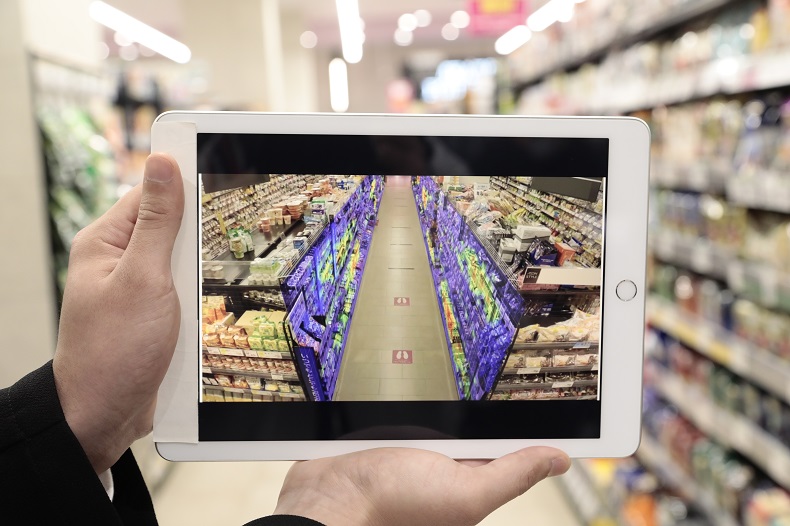 The system collects information about store shelves, for example, counting the number of times which products customers stretched their arms for. It can also visualize data in the form of heat maps.
The system collects information about store shelves, for example, counting the number of times which products customers stretched their arms for. It can also visualize data in the form of heat maps.
――What are your thoughts on the importance of data-driven practices in AI technology?
Suzuki: I believe that experienced retail staff have accurate knowledge in terms of product lineup and store layout, but there's a limit to how much information humans can manually measure and gather. With labor shortages being an issue in many industries, AI can assist in those areas and help businesses formulate improvement measures that are based on objective data.
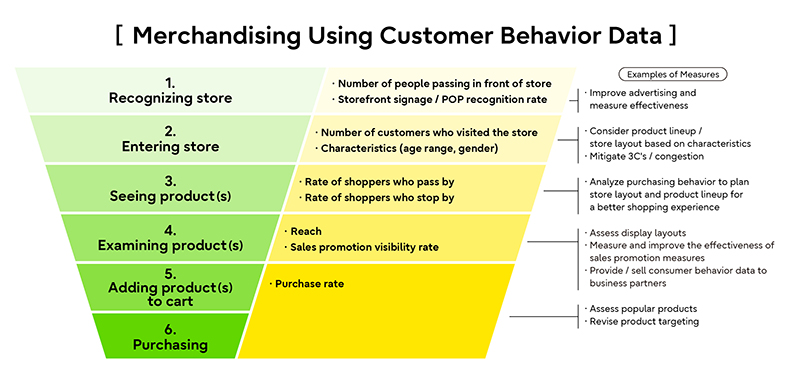 Data-driven store operations are achieved by detecting each and every action.
Data-driven store operations are achieved by detecting each and every action.
AI Cameras May Improve Customer Service Quality and Customer Experience
As of May 2022, CWS has been implemented in 25 stores. Yamamoto describes the concrete effects of this implementation.
Yamamoto: Our current focus is real-time detection. We have been able to detect liquor sales to minors with 90% accuracy. This means that even if sales staff mistakes a minor for an adult, the data provided by the highly accurate system will reduce their risk of violating the law. Furthermore, stores that focused on “customers considering to buy” detection experienced an increase in sales of over 130% on average, which in turn became a significant reason to expand the use of these AI cameras to each store.
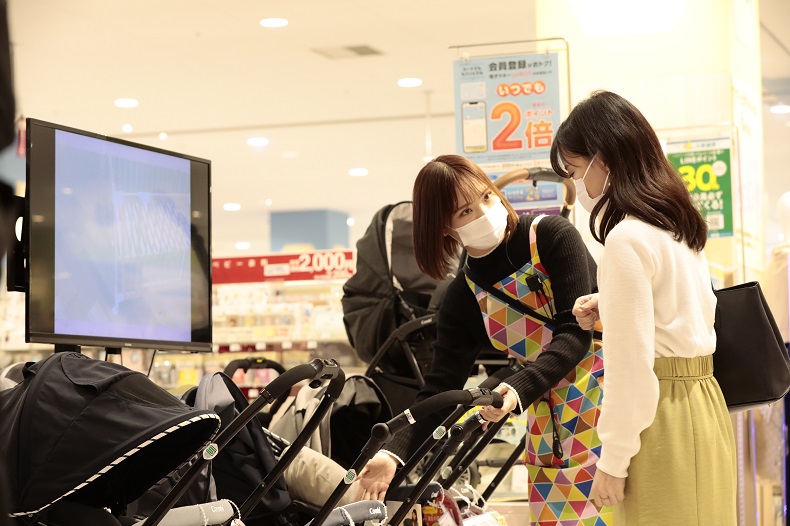 “customers considering to buy” detection enables customer service that balances customer satisfaction and efficiency.
“customers considering to buy” detection enables customer service that balances customer satisfaction and efficiency.
Hideaki Kojima, the store manager of AEON STYLE Kawaguchi, explained the effects the technology has had on the retail floor.
Kojima: Since we have large sales floors, we often hear from customers that there are never any employees nearby when they want to ask about products. We applied AI cameras to customer service in order to solve such issues. The increased purchase rate that followed implementation gave employees a confidence boost. In addition, each employee now has more opportunities to assist customers and report that they now look forward to helping customers. And we, On-site staff, also realized that the end goal of DX should be to create a lively working environment with motivated employee, using the implementation of the AI system as a starting point.
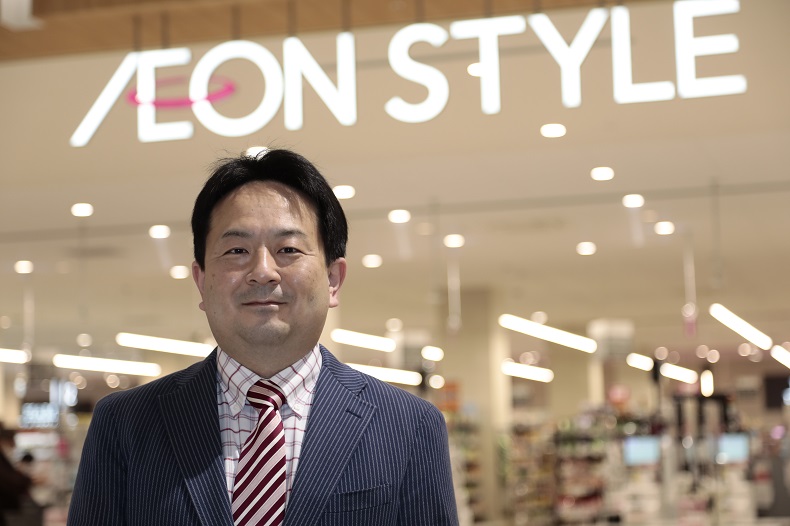 Hideaki Kojima, Store Manager, AEON STYLE Kawaguchi
Hideaki Kojima, Store Manager, AEON STYLE Kawaguchi
Yamamoto further explains that the data accumulated using CWS will be a valuable asset for future data-driven store operations.
Yamamoto: For a long time, data utilization in the retail industry was limited to POS terminals, which could only collect purchase history.
This AI technology is capable of collecting far more detailed data, such as the number of people who pass through an aisle, stop in front of a product, pick a product and put in their cart. We can even acquire data regarding pre-purchase customer behavior and can calculate the brick-and-mortar store's rate of perchase equivalent of what e-commerce calls "conversion rates." This valuable information allows us to identify where the issues lie. Currently, we are collaborating with Fujitsu to tackle data-driven store operations to achieve quantitative effects by reworking layouts based on traffic analysis.
 "Value is generated from data-driven practices that utilize data as information." - Minoru Yamamoto
"Value is generated from data-driven practices that utilize data as information." - Minoru Yamamoto
Increasing Future Experience Value and Creating a Prosperous Lifestyle
 Minoru Yamamoto and Tomomi Suzuki passionately discuss next steps in smart store transformation
Minoru Yamamoto and Tomomi Suzuki passionately discuss next steps in smart store transformation
Finally, we asked them about their future prospects for smart store transformation.
Yamamoto: We have set a milestone to implement a new, complete system at the same time a new store is built. In that sense, our first step is to firmly establish our new store, scheduled to open in Tennocho, Yokohama in the fall of 2022, as the next-generation smart store. We will continue to work on these initiatives, track each of our achievements, and properly deploy a highly utilized system. We hope to incorporate mechanisms that increase both customer experience value as well as employee satisfaction, and aim for DX that combines both CX and EX.
Suzuki: As for creating the stores of the future, I would like to endeavor to design smart stores further based on scientific evidence. For example, stores based on humanities and psychology that have flow lines that make it easier to shop, or stores that incorporate layouts that encourage customers to buy more. I would like to develop a scheme in which we can test out such ideas in a virtual space and ensure they have the intended effect before we spend time and money implementing those ideas in real stores. There are more areas in which science can contribute to our everyday lives. By proposing technology that directly contributes to real lives, we hope to work with AEON RETAIL and our other customers to help solve social issues and improve experience value.



